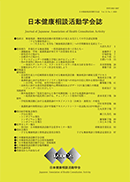Objective: This research was undertaken to promote self-management behavior of junior high school students with food allergies, to develop peer support which can correspond appropriately to an emergency, and to estimate the behaviors through preliminary guidance of a school excursion.
Method: Third grade of junior high school students (154 people) in A area were subjects of this study. First, “group guidance" was administered to students with food allergies (17 people). Then “whole guidance" was given to all targeted third graders. Finally “group guidance" was administered to the peer, the group leader, and the student in charge of health in the group (26 people). Regarding “whole guidance," the problem-solving learning method was used: a fictitious case was prepared. Teachers presented it in front of students; then students considered the problem and the solution as a group. Analyses were conducted respectively of groups of “students with allergy," “peer," and “other students."
Result: The scores of “correspondence in case of emergency" rose significantly in all groups during learning (students with allergy, p=.043; peer and other students, p=.001). However, the scores of “peer" and “other students" fell significantly during the half year after learning was concluded (peer, p=.032; other students, p=.049). Regarding the question “Was it possible to behave while being conscious of the things learned during a school excursion?", “students with allergies" scored significantly higher than “peers" and “other students" did (peer, p=.015; other students, p=.001).
Conclusion: Results suggest that the learning methods which make students consider using a case in “whole guidance" and repeatedly make them check by “group leading" were effective to promote self-management behavior of junior high school students with food allergies and to develop peer support.
View full abstract
